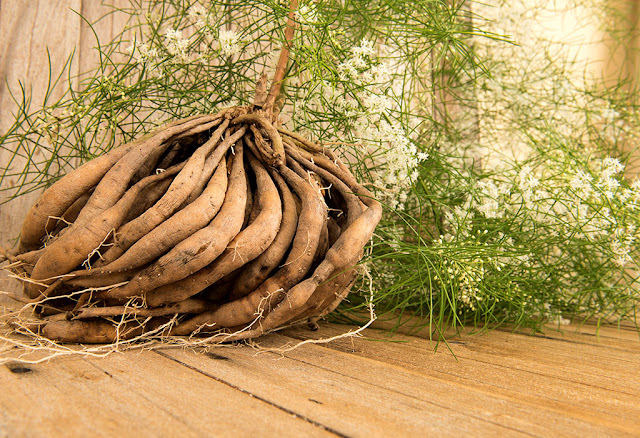Shatavari: Understanding the Role of this Powerful Ayurvedic Herb
Ayurveda is an ancient form of medicine that has been used for centuries in India. One of the key herbs used in Ayurveda is Shatavari, which has a range of benefits for health and wellbeing.
Shatavari, a popular Ayurvedic herb that has been used for centuries to promote women's health is a versatile herb that has been used for a variety of purposes, including
- Promoting lactation
- Improving fertility
- Reducing inflammation
- Boosting immunity
It is used for many purposes, including as a fertility enhancer, as a general tonic, and as a treatment for various gastrointestinal disorders. It is thought to be beneficial because of its many active constituents, including saponins, sterols, and minerals.
In this blog post, we will explore the many benefits of Shatavari and understand how this powerful Ayurvedic herb can help you lead a healthier life.
Shatavari is a perennial plant that is found in the hot and humid regions of India. The plant belongs to the family of Asparagaceae. The roots and leaves of this plant are used for medicinal purposes and a wide range of health problems. The nutraceuticals benefit of it are numerous and include its ability to improve digestion, boost energy levels, and helps protecting the body against oxidative stress. Some other health benefits of it are listed below.
Promote lactation - Nursing mothers have been using Shatavari for centuries to increase milk production and improve the quality of breast milk. The herb is rich in phytoestrogens, which can help increase the levels of prolactin, a hormone that stimulates milk production in nursing mothers.
Improve fertility -. The herb has been shown to regulate the menstrual cycle and promote ovulation, making it an excellent choice for women who are trying to conceive. It can also help reduce the symptoms of premenstrual syndrome (PMS), such as mood swings, cramps, and bloating.
Anti-inflammatory: Inflammation is a natural response of the body to injury or infection, but chronic inflammation can lead to a range of health problems, including heart disease, diabetes, and cancer. Shatavari contains saponins, which have been shown to reduce inflammation in the body and protect against oxidative stress.
Immune booster: The herb contains polysaccharides, which stimulate the production of white blood cells and enhance the body's immune response. This makes it an excellent choice for people who are prone to infections or those who want to boost their overall immunity.
How to Use Shatavari
Shatavari is available in many forms, including capsules, powders, and liquid. The herb has a slightly sweet taste and can be added to drinks or food. It is typically recommended to take Shatavari with milk to enhance its benefit.
One of the easiest ways to use Shatavari is by taking it in capsule form. Capsules are easy to take and can be taken with water or milk. However, it is essential to follow the recommended dosage on the label or as prescribed by your Ayurvedic practitioner.
The Powder is another popular option, and it can be added to smoothies, juices, or other beverages. You can also mix it with warm milk and honey for a soothing bedtime drink. However, it is essential to note that Shatavari powder can be quite potent, so it is essential to start with a small amount and gradually increase the dosage.
Shatavari supplements in liquid form are a convenient and popular way to consume this herb. Liquid extracts of shatavari are made by steeping the dried roots of the Asparagus racemosus plant in a liquid, typically alcohol or water, to extract the active compounds.
One of the benefits of liquid supplements is that they are easily absorbed by the body, making them a fast-acting and effective option. They are also highly concentrated, so only a small amount is needed to achieve the desired effect.
As a third-party manufacturer of nutraceuticals, Zeon Lifesciences works with other companies to create customized products that meet their specific needs. By incorporating Shatavari into our formulations, we are able to offer these companies a natural and effective ingredient that may help to support the health and wellness.
Precautions and Side Effects
Shatavari is generally considered safe for most people when taken in the recommended dosage. However, it is essential to consult with your Ayurvedic practitioner before starting any new supplement, especially if you are pregnant, nursing, or have a pre-existing medical condition.
There are some side effects associated with it, including gastrointestinal upset, nausea, and diarrhea. These side effects are typically mild and can be avoided by following the recommended dosage on the label.
Conclusion
While Shatavari is generally well-tolerated, it is important to speak with a healthcare provider before using this supplement, especially if you are pregnant, breastfeeding, or have a medical condition. It is also important to choose a high-quality product from a reputable manufacturer to ensure purity, potency, and safety.
Overall, it is a valuable addition to any natural wellness regimen, offering a wide range of potential health benefits and supporting the body's natural balance and vitality.







Comments
Post a Comment